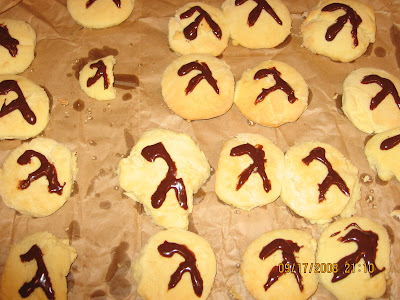This morning, I was asked to do a few minutes in Sunday School - after the Kyrie and before the sermon (which I didn't want to miss) so I embarked on the next letter daleth,
ד.
As a small amount of preparation, I had thought of using
ד is for
דרך [drk=way] since 'way' is a common word and similar to a couple of English words - direct and Derek - giving a slight advantage in memory. But those letters are notoriously difficult to see and distinguish - but why make it easy for young eyes!
Anyway, apart from this preparation, I had no other props, so for the first time I got the children to find the letters among the blocks. This too is not an easy task, but in a trice, their fingers and eyes were up to the job.
There they were heads down, gathered in a huddle around the pile of blocks that have their home in a small tray. My first questions were review - find the alef, then the bet, then the gimel. This is a substantial exercise. One has to pick up each block and search around the four faces with Hebrew letters and recognize the shape. They learned that the letters used in English are the Latin alphabet and they soon learned to ignore these ones. They were successful in finding several alefs, bets, and gimels - congratulations to all for the achievement of a joyful first objective:
At the completion of this course, the student, given an example, should be able to find the equivalent in a pile of blocks!
I think there were some students who had missed several prior lessons, but they also seemed to be happy with the others in their focused scramble among the blocks.
Then the new letter - where is a daleth? This proved harder. Vav and zayin were frequent confusion, but dalet and resh
ר and the kaf-sofit (one of five letters with a special form for the end of a word)
ך came up from the pile and formed the word
דרך. I explained the differences in the letters - the stroke sizes (distinguishing from vav
ו and zayin
ז ) , the sharp and the round edges of
ד and
ר, the different kafs
ך and
כ - a tricky problem in seeing.
Then I even added a few letters to the front (back - upside down!) of the word to make 'the way'
הדרך, and
בדרך in the way
or on the way. Too much learning at once? No - too much fun. I said to them that they are learning what they do not yet know, but that as we continue through the season at 10 minutes (I was late for the sermon) a week for the next six months, they would be surprised at how much they knew and they would have a deep joy in discovery. Then one asked me - do you know the Hebrew for joy? I said there was more than one word, and I couldn't remember the exact word - but I said I would substitute the first word of the psalms - Happy
אַשְׁרֵי. [asheri]
(You can see the psalm in Hebrew and English
here - you can listen too. Notice the word
דרך in the second line).
To come: a summary of the vocabulary we have seen so far, all of it in a Biblical context.
Then: a reasonable objective for the whole year - can we begin to read a psalm? Will we try some vocabulary quizzes? Could there be some memorization of verses in Hebrew and English? Flash cards - here we come.
For joy - try Psalm 149:2,
יִשְׂמַח יִשְׂרָאֵל בְּעֹשָׂיו; בְּנֵי-צִיּוֹן, יָגִילוּ בְמַלְכָּםLet Israel rejoice in his Maker; let the children of Zion be joyful in their King.
[yishma israel be'osayiv, beni-tsion yagilu bemalkam]



 Bet ב begins the text of the Bible. It also begins the second word.
Bet ב begins the text of the Bible. It also begins the second word.